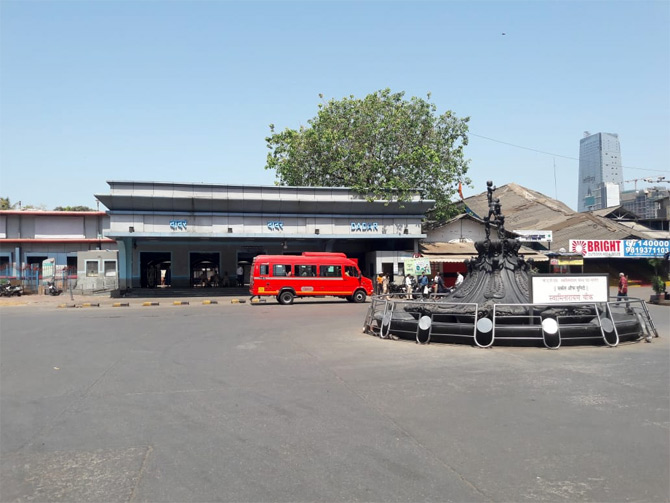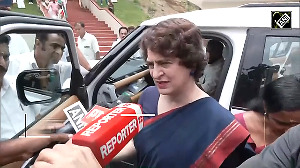In this lockdown, no matter how many similarities the memory dredges up from past events and associations, there is one thing that has no precedent: The isolation that it has imposed on people, reports Arundhuti Dasgupta.

At a small gathering one mildly wintry evening not so long ago, talk veered, as usual, to the city's incorrigible traffic.
A 15-minute journey took me an hour, said a friend.
Another lamented that the city's roads were perhaps the most overworked in the world. Never empty, never out of use.
Neither rain nor riot, not even a terror attack such as the one on 26/11 or the 12 bomb blasts that ripped through it in 1993, have managed to clamp the city down.
Each time, Mumbai's indomitable spirit has prevailed -- marched into offices, jostled its way into packed public transportation and rolled into the cliched headlines and conversations that have sought to explain this inexplicable, indefatigable resolve against adversity and attack.
But this time the city has curled up and locked itself in.
Its desolate streets look like an image out of an eerie sci-fi movie -- as though some alien has robbed them of all life.
Mumbai's spirit seems to have been firmly bottled in.

Of course there are many who would argue that the spirit was bottled in a long time ago.
Salman Rushdie has written in many articles how this is not the Bombay he knows or grew up in.
Naresh Fernandes, editor of scroll.in and author of a biography of Mumbai (City Adrift), writes that the term 'spirit of Mumbai' is a relatively modern concoction and that it emerged out of a bombed-out city.
He traces it to March 1993, when a day after 12 car bombs ripped through Mumbai, the city picked itself up and went to work.
The image and metaphor has stayed with it since.
He writes, 'The bomb blasts would spawn another myth: that of the 'spirit of Mumbai'... The first time I remember hearing the phrase was on an episode of the news programme The World this Week.'
He believes that the dogged energy that the term stands for is long gone.
The indomitable will of the people that has been hailed so often by politicians and others is just an attempt to ignore the slow numbing of its soul.
Perhaps it is just a way that the city has learnt to cope with the fear that has always been a part of its psyche.
Panic has walked its streets before: In 1992, when it was racked by riots following the demolition of the Babri Masjid; after the bomb blasts a few months later in 1993; during the cholera outbreak in the early 1900s; and way back during the bubonic plague in 1896-1897.

Wars, epidemics and intermittent violence over the years have all left Mumbai bruised and beaten.
But nothing has ever emptied its streets or kept people from going to work.
An elderly cloth merchant whose father set up his textile trade in one of the oldest markets of the city, the Mooljee Jaitha market, had earlier spoken about his experiences during the Quit India Movement when Mahatma Gandhi asked traders to burn all foreign goods.
Traders sold their imported fabric in the morning and then shut shop to go participate in the bonfires that were being lit all around Victoria Terminus (now Chhatrapati Shivaji Maharaj Terminus).
Ask anyone and they will tell you this: Come what may, dhandha (business) has to go on.
"I don't remember Bombay like this ever," says an 88-year-old resident.
He grew up in the city and continues to be a regular on the golf course, which he rues has now been shut down.
The only analogy he can draw between the city today and the one in his living memory stretches back to 1942.
The Japanese army was dropping bombs in the vicinity and his father panicked, fleeing his home and shop to go back to his native village in Rajkot in Gujarat.
"My father pushed me out of the window of our house in the mad scramble to escape the city and go back to our families," he remembers.
They took a train home but in a few months were back in the central suburb of Ghatkopar where they lived at the time.

The current lockdown has brought a rush of memories among many from his generation.
A resident who is in her late 70s recalls the Samyukta Maharashtra Movement of the late 1950s and 1960s.
Maharashtra was becoming a single linguistic state and outsiders (those who spoke any other language) were being targeted.
In the panic that ensued, families drew together, congregating in single rooms -- sometimes even 18 to 20 at a time -- in a city where space has always been a crush.
Space and time, two of the city's big concerns, are also among its starkest markers in the time of a lockdown.
Amidst the buzz of hand-washing and physical distancing on various messenger apps and social media platforms, a common refrain is about how one could (hypothetically, of course) zip down to the Gateway of India from Thane (two ends of the city in a way) in just about 30 minutes -- a journey that would otherwise take nearly two hours.

In the city of dreams, time is money and suddenly its million-plus residents are left with a lot of it.
It has unnerved many, chaos and madness being a part of their lives.
But it has also (for people of a certain generation) taken them back to a simpler time, when not everything was an app away and household chores were a matter of everyday routine.
The post-reform economy that most households are used to today cannot fathom a time when one had to walk to a store or stock up on rations.
One family said that the sense of solidarity that is being summoned to fight a global pandemic reminded them of 1971, when India and Pakistan went to war over the liberation of Bangladesh.
People knew they were fighting the big fight, so food was rationed and shared, and evenings were usually spent huddled by a radio.
While families kept indoors and had their windows boarded up, they were comforted by the fact that neighbours or cousins were just a wall (or yell) away.

In this lockdown, no matter how many similarities the memory dredges up from past events and associations, there is one thing that has no precedent: The isolation that it has imposed on people.
For a city where continuous human contact is second nature, akin to breathing and walking, this is the biggest adjustment people have to make.












 © 2025
© 2025